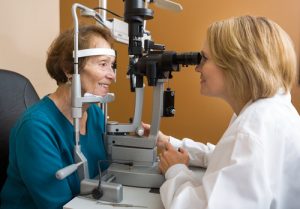 As we all age, some natural decline in our senses is to be expected.
As we all age, some natural decline in our senses is to be expected.
Yet even a slight deterioration of our eyesight can be scary. Not only can it get in the way of our ability to understand our surroundings, it can have a significant impact on our comfort, safety and overall independence.
Advertisement
There is good news. Age-related vision loss may respond better to a new kind of laser therapy.
An improved laser treatment has been shown to slow the progression of age-related macular degeneration (AMD), which is a leading cause of vision loss. That’s according to a study by the University of Melbourne in Australia, published in the Journal of the Federation of American Societies for Experimental Biology (FASEB).
Researchers examined the effectiveness of what’s being called the “nanosecond laser” for patients with early AMD. They found that unlike other laser treatments, this low-impact, low-energy kind is not likely to damage the retina. The retina is the tissue at the back of our eyes that contains much-needed light detecting cells.
RELATED READING: New ‘bionic’ solution to improve your vision
Tests involved a total of 50 patients with AMD – those who had a single session of nanosecond laser treatment and were checked two years later. It’s the first study to explain how the new laser treatment may improve eye health in patients with AMD.
What’s age-related macular degeneration?
Generally, AMD is a relatively painless eye condition that results in the loss of central vision over time. It’s the leading cause of permanent impairment of fine or close-up vision – which is necessary for reading – among people who are 65-years-old and older, according to the Centers for Disease Control and Prevention (CDC). Estimates suggest Americans age 40 and over with AMD are about 1.8 million, while another 7.3 million are at risk of developing it, CDC reports.
Correcting AMD through laser treatment
Regarding treatment, laser surgery is typically used to seal leaking blood vessels caused by AMD, slowing down the loss of central vision. The dry form of AMD causes a gradual breakdown of light-sensitive cells in the retina, and this may not affect vision significantly.
The wet form, however, occurs when abnormal blood vessels grow under the retina. These vessels then leak blood and fluid, eventually causing scarring. When this happens, vision loss can occur quite quickly.
Both hot and cold laser therapy are used to treat wet AMD. Hot laser treatment seals blood vessels that abnormally leak in the retina, which prevents their growth. On the other hand, a cold laser can destroy the new, leaky vessels without ever affecting normal tissue.
If your blood vessels are growing near or under the center of the retina, cold laser treatment just may be better for you.
Advertisement
RELATED READING: Another good reason to raise a glass of red wine
New therapy isn’t completely risk-free
But be warned: Such procedures and treatments aren’t without risks and can be expensive. For one thing, the laser may further damage the center of the retina, which results in some vision loss and a possible permanent blind spot. This is especially likely if leaking blood vessels are too close to, or directly in the center of the retina.
So be sure to consult with your doctor before getting laser treatment to correct AMD. Remember to ask how all of these risks apply to you while mentioning any other concerns you may have. After all, you’re not getting any younger!
